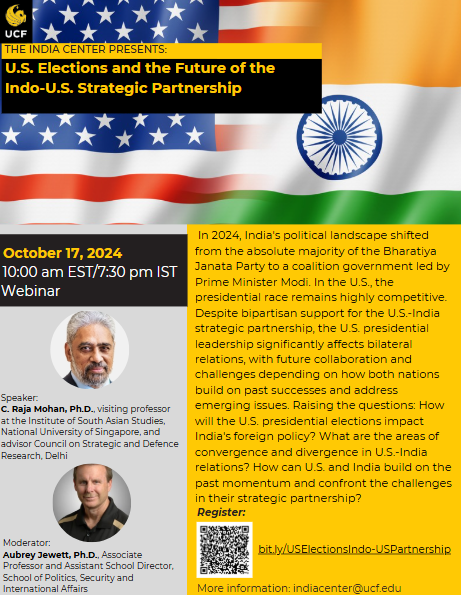Webinar explores how shifting U.S. policies and global dynamics are shaping the future of the Indo-U.S. strategic partnership
By Arjun Sherugar
On October 17, 2024, The India Center at UCF hosted a virtual discussion titled “U.S. Elections and the Future of the Indo-U.S. Strategic Partnership,” featuring C. Raja Mohan, Ph.D., visiting professor at the Institute of South Asian Studies at the National University of Singapore and advisor at the Council on Strategic and Defense Research in Delhi. The event was moderated by Aubrey Jewett, Ph.D., Associate Professor and Assistant School Director in UCF’s School of Politics, Security and International Affairs.
Mohan offered a wide-ranging analysis of the evolving Indo-U.S. relationship in the context of the 2024 U.S. elections. He explored how both the Trump and Biden administrations approached India differently—highlighting the former’s restrictive immigration policies and the latter’s emphasis on economic cooperation through the Indo-Pacific Economic Framework. Despite these differences, Mohan emphasized that both administrations recognized India’s strategic importance, particularly in balancing China’s growing influence.
“The U.S. has learned to live with India’s independent foreign policy,” Mohan noted, pointing to the Biden administration’s pragmatic approach during the Russia-Ukraine conflict.
He explained that shared concerns over China have helped both nations find common ground, even when their positions diverge on other global issues.
Following the presentation, Jewett led a moderated discussion, during which attendees posed questions about trade, defense cooperation, and the future of multilateral diplomacy. The conversation underscored the complexity of maintaining strong bilateral ties amid shifting global dynamics.
Reflecting on the event, Yogesh Joshi, Ph.D., Director of The India Center, remarked,
“This conversation helped our students and community understand that the U.S.-India relationship is not just about shared values—it’s also about shared interests. As Dr. Mohan pointed out, the strategic logic of this partnership is becoming more compelling in today’s geopolitical environment.”
